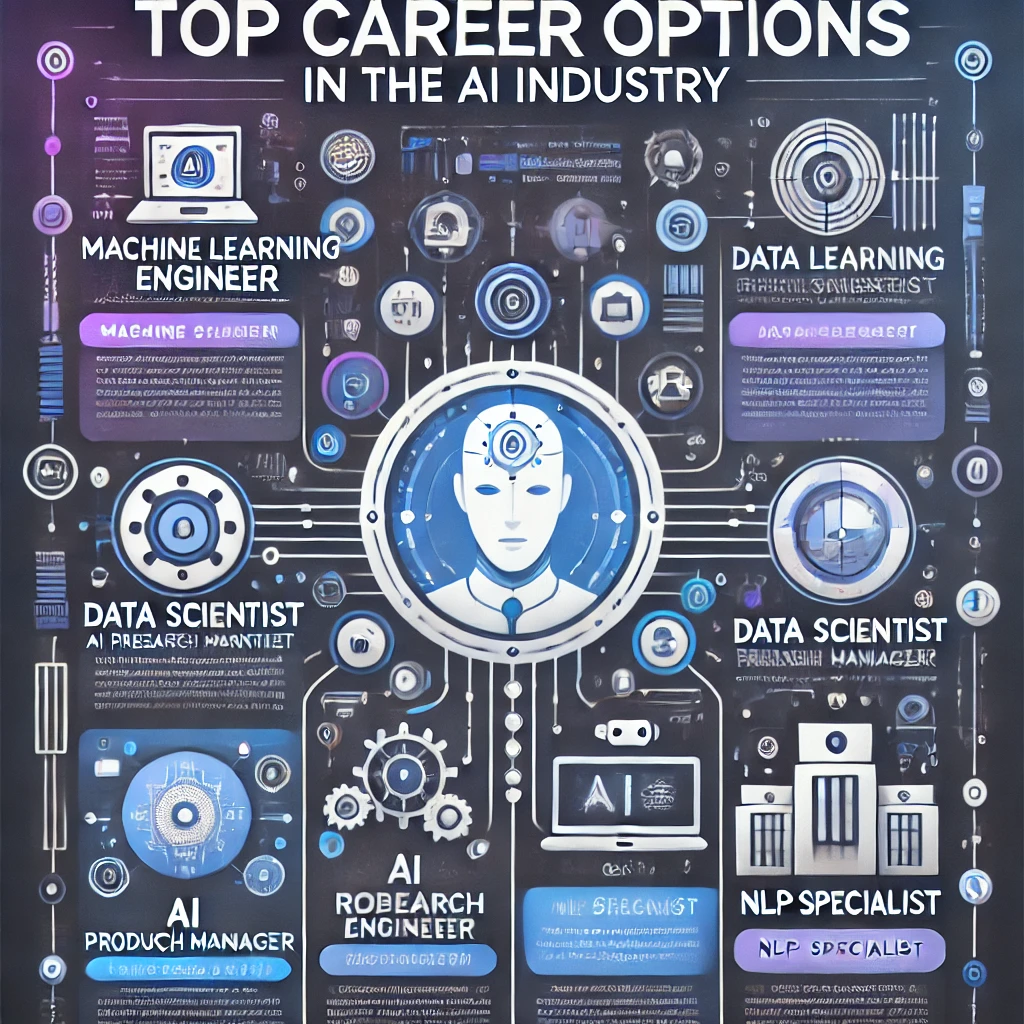The Artificial Intelligence (AI) industry has rapidly emerged as one of the most promising and lucrative fields in technology. For students interested in a career in AI, understanding the best options available before and after graduation is essential. This article provides a comprehensive guide to help you navigate the top career paths in the AI industry, along with actionable steps to prepare for and succeed in this field.

What is AI and Why is it Important?
Artificial Intelligence is the simulation of human intelligence processes by machines, especially computer systems. These processes include learning, reasoning, problem-solving, and language understanding. AI is revolutionizing industries like healthcare, finance, transportation, and entertainment by enabling smarter decision-making, automation, and enhanced efficiency.
The demand for AI professionals is growing exponentially, and this presents an excellent opportunity for students and professionals to build rewarding careers in this field.
To learn more about AI basics, visit What is AI and its Importance.
Top Career Options in the AI Industry
Machine Learning Engineer

- Role: Develop and implement algorithms that allow computers to learn from data.
- Skills Needed: Python, TensorFlow, PyTorch, data analysis, and statistics.
- Salary Range: $95,000 – $150,000 annually (varies by location and experience).
- For a deeper dive into this career, explore Machine Learning Careers.
Data Scientist
- Role: Analyze and interpret complex data to provide actionable insights.
- Skills Needed: R, Python, SQL, data visualization, and machine learning.
- Salary Range: $90,000 – $140,000 annually.
- Check out Data Scientist Roles Explained.
AI Research Scientist
- Role: Conduct research to develop new AI models and technologies.
- Skills Needed: Deep learning, neural networks, mathematics, and programming.
- Salary Range: $100,000 – $160,000 annually.
- Learn more at AI Research Careers.
AI Product Manager
- Role: Oversee the development and deployment of AI-powered products.
- Skills Needed: Project management, product design, business strategy, and AI basics.
- Salary Range: $80,000 – $140,000 annually.
- Read AI Product Management Guide.
Robotics Engineer
- Role: Design and build robots powered by AI technologies.
- Skills Needed: Mechanical engineering, programming, control systems, and AI.
- Salary Range: $85,000 – $130,000 annually.
- Learn about Robotics Engineering Careers.
Natural Language Processing (NLP) Specialist
- Role: Develop systems that allow machines to understand and process human language.
- Skills Needed: Computational linguistics, machine learning, and Python.
- Salary Range: $90,000 – $140,000 annually.
- Discover NLP Career Opportunities.
Computer Vision Engineer
- Role: Develop AI models to interpret and process visual data like images and videos.
- Skills Needed: OpenCV, deep learning, and image processing.
- Salary Range: $90,000 – $150,000 annually.
- Visit Computer Vision Careers.
AI Ethics Specialist
- Role: Address ethical concerns and ensure responsible use of AI technologies.
- Skills Needed: AI knowledge, philosophy, legal frameworks, and critical thinking.
- Salary Range: $70,000 – $110,000 annually.
- Explore AI Ethics Roles.
How to Prepare for a Career in AI Before Graduation
Choose the Right Educational Path
- Enroll in relevant degree programs like Computer Science, Data Science, or AI-focused courses.
- Take electives or certifications in AI, machine learning, and programming languages like Python and R.
- Read Top Courses for AI.
Build a Strong Foundation in Mathematics and Programming
- Focus on calculus, linear algebra, probability, and statistics.
- Practice programming with platforms like HackerRank, LeetCode, and Kaggle.
- Explore Math and Programming for AI.
Participate in AI Competitions and Projects
- Join platforms like Kaggle or DrivenData to work on real-world datasets.
- Participate in hackathons and AI competitions to gain practical experience.
- Learn from AI Competitions Guide.
Pursue Internships in AI
- Seek internships at tech companies or startups working in AI to gain hands-on experience.
- Learn from industry professionals and build a network of contacts.
Develop a Portfolio
- Showcase your AI projects, certifications, and achievements on platforms like GitHub.
- Create a personal website or LinkedIn profile to attract potential employers.
- See Building an AI Portfolio.
What to Do After Graduation in the AI Industry
Entry-Level Roles
- Apply for roles like Junior Data Scientist, AI Developer, or ML Engineer.
- Continue learning on the job and take advanced certifications to upskill.
Pursue Advanced Studies
- Consider a master’s or Ph.D. in AI, Machine Learning, or Data Science.
- Specialize in emerging fields like quantum computing or ethical AI.
- Check Advanced Studies in AI.
Stay Updated with Industry Trends
- Follow AI news, research papers, and industry leaders.
- Subscribe to platforms like Medium, Towards Data Science, and AI-specific blogs.
- Visit Latest AI Trends.
Build a Network
- Attend AI conferences, webinars, and workshops.
- Join AI-focused online communities and professional organizations like IEEE or ACM.
Focus on Soft Skills
- Develop communication, teamwork, and problem-solving skills.
- These skills are critical for collaboration in multidisciplinary teams.
Target High-Growth Industries
- Explore opportunities in industries heavily investing in AI, such as healthcare, finance, and autonomous vehicles.
Long-Term Strategies for Success in AI
Continuous Learning
- Stay ahead by learning new programming languages, tools, and frameworks.
- Take online courses on platforms like Coursera, edX, and Udemy.
Earn Certifications
- Gain certifications like Google AI, TensorFlow Developer, or AWS Machine Learning.
- These add credibility and improve job prospects.
Contribute to Open Source Projects
- Collaborate on GitHub or other platforms to gain recognition in the AI community.
Start Your Own AI Venture
- Identify gaps in the market and develop AI solutions to address them.
- Build a team and seek funding to scale your ideas.
Mentor and Teach
- Share your knowledge with aspiring AI professionals.
- Build your personal brand by blogging, creating YouTube tutorials, or teaching online courses.
Conclusion
The AI industry offers immense opportunities for students and professionals alike. By carefully choosing your educational path, gaining practical experience, and staying updated with the latest industry trends, you can build a successful career in this dynamic field. Whether you’re just starting or looking to advance, continuous learning, networking, and contributing to the community will pave the way for long-term success. Take the first step today, and let your journey in the AI industry begin with confidence and purpose.